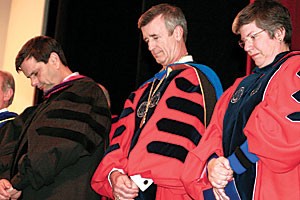Before he arrived for his first day of work about a year ago, President Robert Shelton had a high opinion of the UA. He doesn’t have the same opinion now.
“”It’s even better,”” Shelton said. “”You know the reputation of the UA when you’re in this business, but when you get to see it up close and talk to students and faculty, its even better.””
Shelton said his first year has been a stimulating and positive experience, which he said has been largely due to the community’s acceptance of his new leadership.
It was a dynamic year for the former provost from the University of North Carolina at Chapel Hill, encompassing not only a slew of welcome ceremonies in the fall and legislative lobbying in the spring, but also grumbling and protest from the faculty over about $19 million in budget cuts.
When asked how he’ll remember the year, Shelton’s first response was that he will remember how quickly the time passed.
While he has said and done some things that have garnered him attention, the budget cuts caused the most reaction.
A $9 million cut during the summer was targeted at specific projects and funding requests, while the more recent $10 million cuts, made by Shelton and Provost George Davis, have been bottom-line cuts to department budgets for the next academic year.
Physics department head Pierre Meystre resigned in protest this semester, citing a “”lack of leadership and vision”” within the UA’s higher administration and criticizing its “”apparent inability to make tough decisions.””
In an e-mail message sent to faculty, Meystre wrote that the university is “”suffering a painful death by a thousand cuts.””
At the time, Richard Michod, head of the ecology and evolutionary biology department, said he was also upset with Shelton’s decisions and didn’t think the university could continue at its current stature without eliminating certain underperforming programs or units.
Shelton said he is thrilled he does not have to cut as much from the 2008-2009 school-year budget, and he can understand how some faculty have reacted to years of shrinking funds.
“”I think, intellectually, people understand it and recognize that this is something we need to do, but mentally and emotionally it’s harder to deal with,”” Shelton said.
Of the many challenges he encountered this year, Shelton said managing time has been the hardest to overcome.
“”I’m still learning on the job,”” he said. “”The good news is that there are still a lot of people who want to
educate me. I’m the poster child for lifelong education.””
Shelton said he spends about five nights a week doing something in his capacity as president, leaving time at night and on the weekends to reflect on his work.
He said there are sometimes two- or three-week stretches when he works almost nonstop, and he relishes the free time he does have, saying it helps to improve his performance.
“”You always need a little bit of free time to recharge your batteries,”” he said.
Shelton said the spring semester has kept him especially busy in Phoenix, where he has spent a great deal of time lobbying the state Legislature on the university’s behalf.
Working with legislators was good in the sense that they gave him a lot of time to argue his positions, he said.
“”Many of them have different viewpoints, but many of them recognize the role that higher ed must play if Arizona is going to develop beyond a service economy and create the jobs that graduates must have,”” Shelton said.
Shelton had said repeatedly during the course of the year that the UA’s growth and ability to meet its obligations is limited by the small amount of funding it receives from the state.
It was something Shelton said in the fall, during the tuition-setting process, but he still refused to sign onto a statewide
student proposal that would have put pressure directly on state legislators to provide more funding to universities.
Instead, Shelton proposed a 6.5 percent increase to in-state tuition, which was also rejected by the Arizona Board of Regents in favor of a 5 percent compromise between presidential and student proposals.
While regents have sometimes rejected or altered his requests, Shelton said he has enjoyed working with them during the course of the year.
“”We have a very engaged board, and that’s helpful,”” he said. “”What I like about it is that so many members of the board are visible to members of the community.””
Shelton also praised student leaders, especially Associated Students of the University of Arizona President Erin Hertzog and Graduate and Professional Student Council President Paul Thorn, for their work on campus, and said he wants to work with them even more closely in the future.
“”Over the summer, I’d like to get our budget people together (with student leaders) and start to talk about what tuition is, why we have it and what legitimate uses of it are,”” Shelton said.
Shelton said he would like to see more of a consensus between university administration and students.
“”We all embrace certain ideas, like 15 percent for financial aid, but what else should we embrace?”” he asked.









